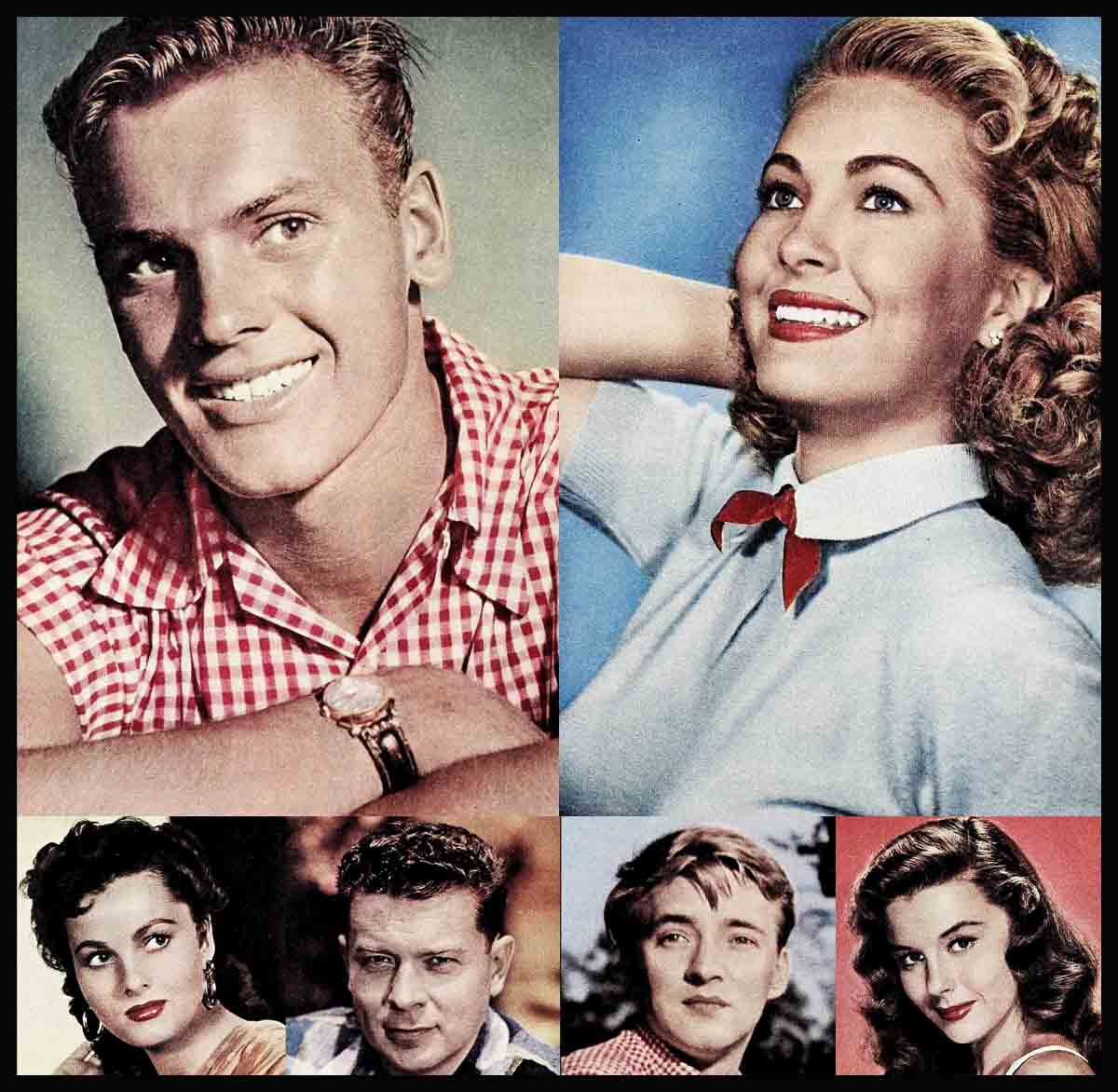
You Chose These Stars!
This is the dramatic story of the winners of Photoplay’s annual “Choose Your Star” contest. However, it begins as a “thank you” because the players would have it no other way. You, the readers, have given this group of prospective young stars one of the finest gifts that can be bestowed in the sometimes uncertain Hollywood world. You have given them your vote of confidence.
The players are grateful. They want you to know it, and they have asked the editors to express their appreciation through the pages of Photoplay.
The tall, sexy blonde with the expressive brown eyes, Beverly Michaels, who hadn’t worked in twelve long, long months, hung up the receiver slowly when she heard the news. For the first time in too many days, she smiled.
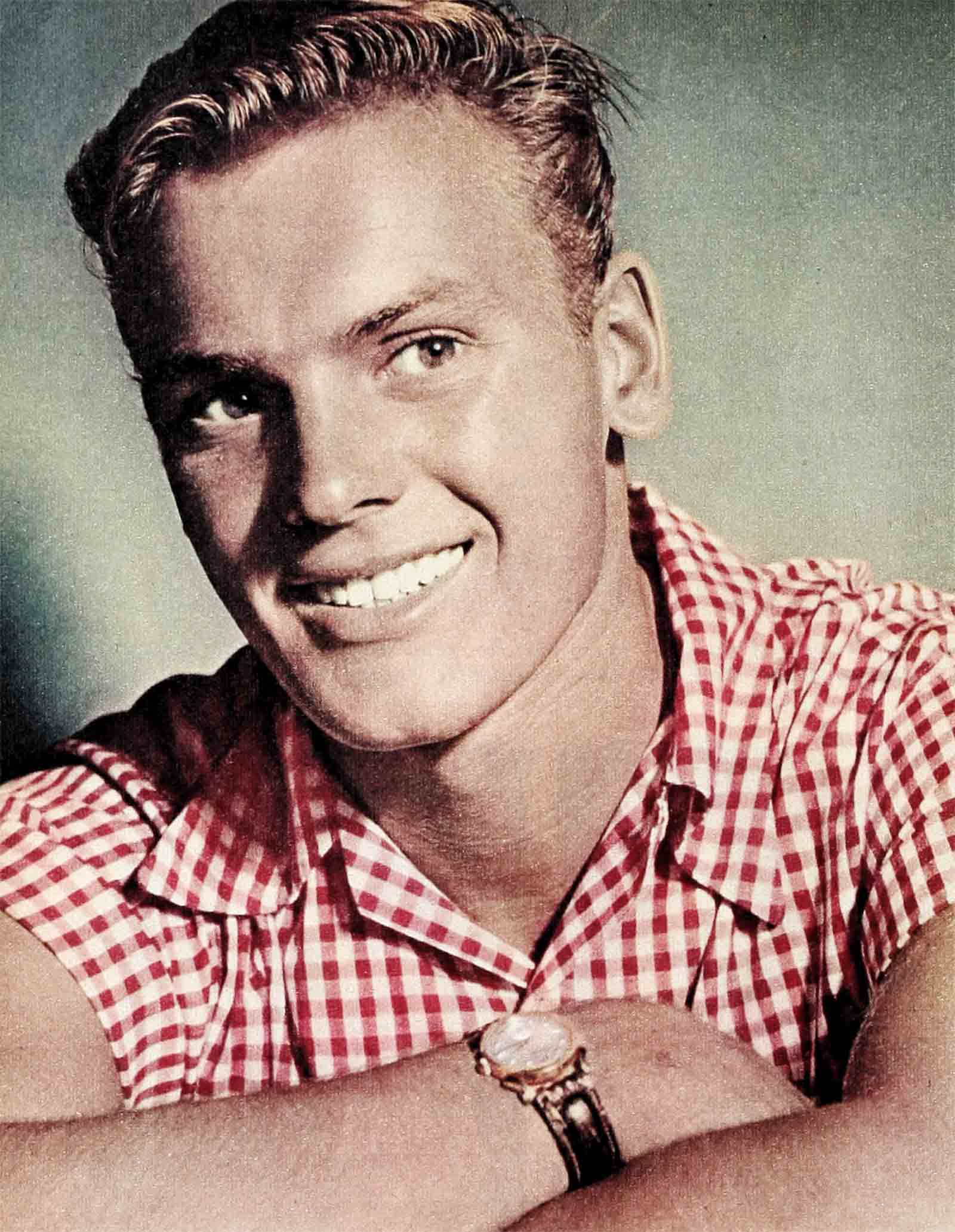
To pretty, red-headed Helene Stanley, a movie veteran at twenty-one, who’d been in motion pictures since “Our Gang” comedies, and who’d just left a major studio and was even then weighing the next move—the right move—“It’s like Christmas! It’s just like Christmas!”
She was paraphrasing the thoughts of talented Arthur Franz who, after long years of working in New York—“eight, ten—sometimes I lose count”—and of waiting on a counter in a small café just off Hollywood Boulevard—working and waiting for today—“It’s just like somebody handed me a present.”
It was a very welcome present that Tab Hunter didn’t know was waiting for him, as he turned slowly up the walk to his one-bedroom apartment in Beverly Hills. He felt sick. Real sick. Would this happen every time he saw himself on the screen? The first time, he’d had to leave the projection room. “There were so many things wrong,” he told his mother later on. “Oh, I’m sure it wasn’t that bad,” she soothed. So he built himself up to seeing Tab Hunter on the screen once again.
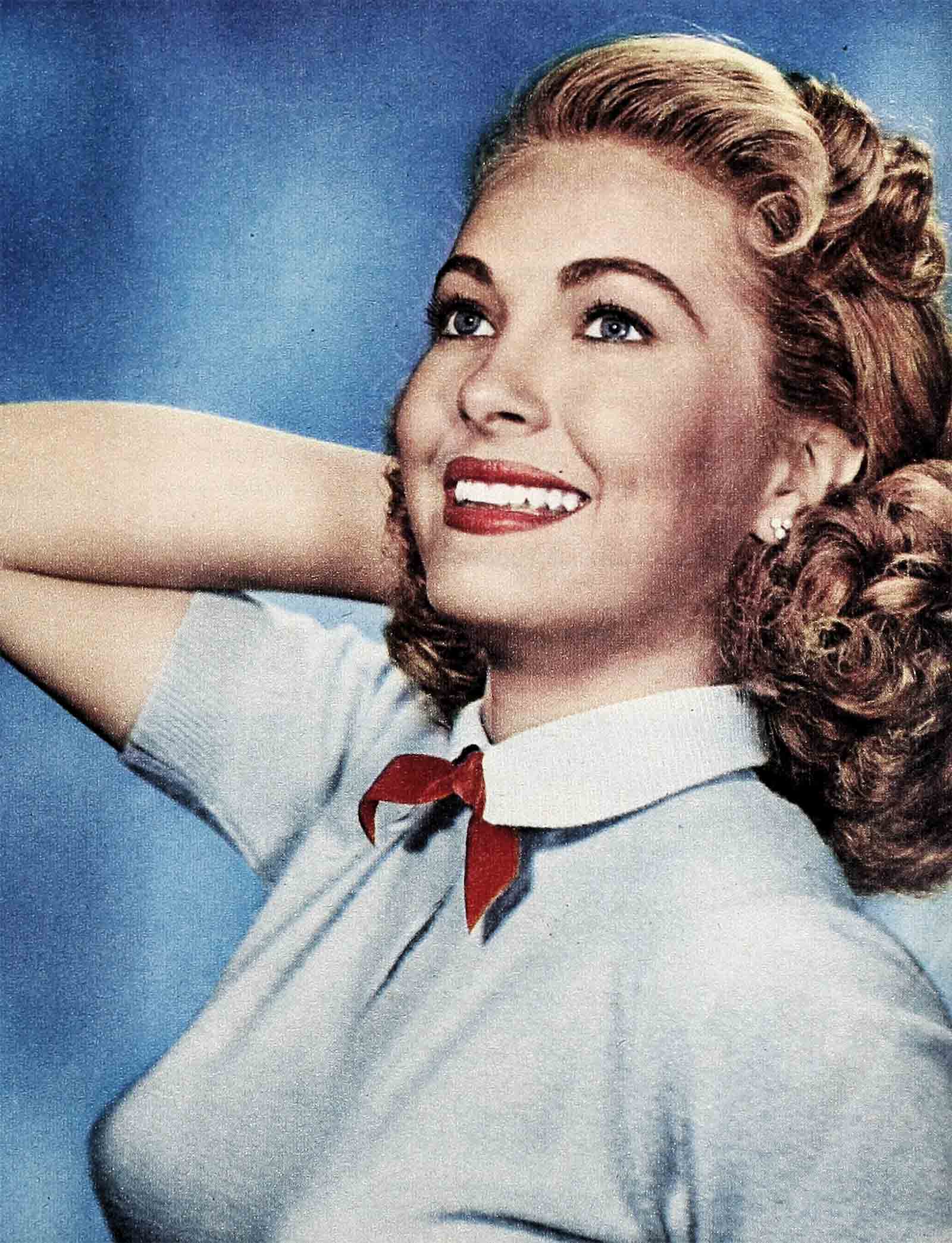
Now he was coming home from seeing his first picture for the third time, still trying to convince himself that maybe his mother was right—maybe he wasn’t that bad. And the news that was waiting for him this time made him feel sick again—giddy sick.
“Me?” he exclaimed, his usually dreamy face lighting up in a blaze through the paleness. Then, as though trying to convince himself. “You mean, I won?”
Nineteen-year-old Lori Nelson, pretty as any golden-haired storybook princess—but a weary little princess in anybody’s book at that moment—walked slowly across the Universal-International lot from the stage where she’d been testing all day for the part which could mean the turning point in her career. It could spell the difference between being an actress and a peppermint-stick ingenue. What did publicity want, she wondered, almost too tired even to go see. Then, joyously. “I did? Are you sure?”
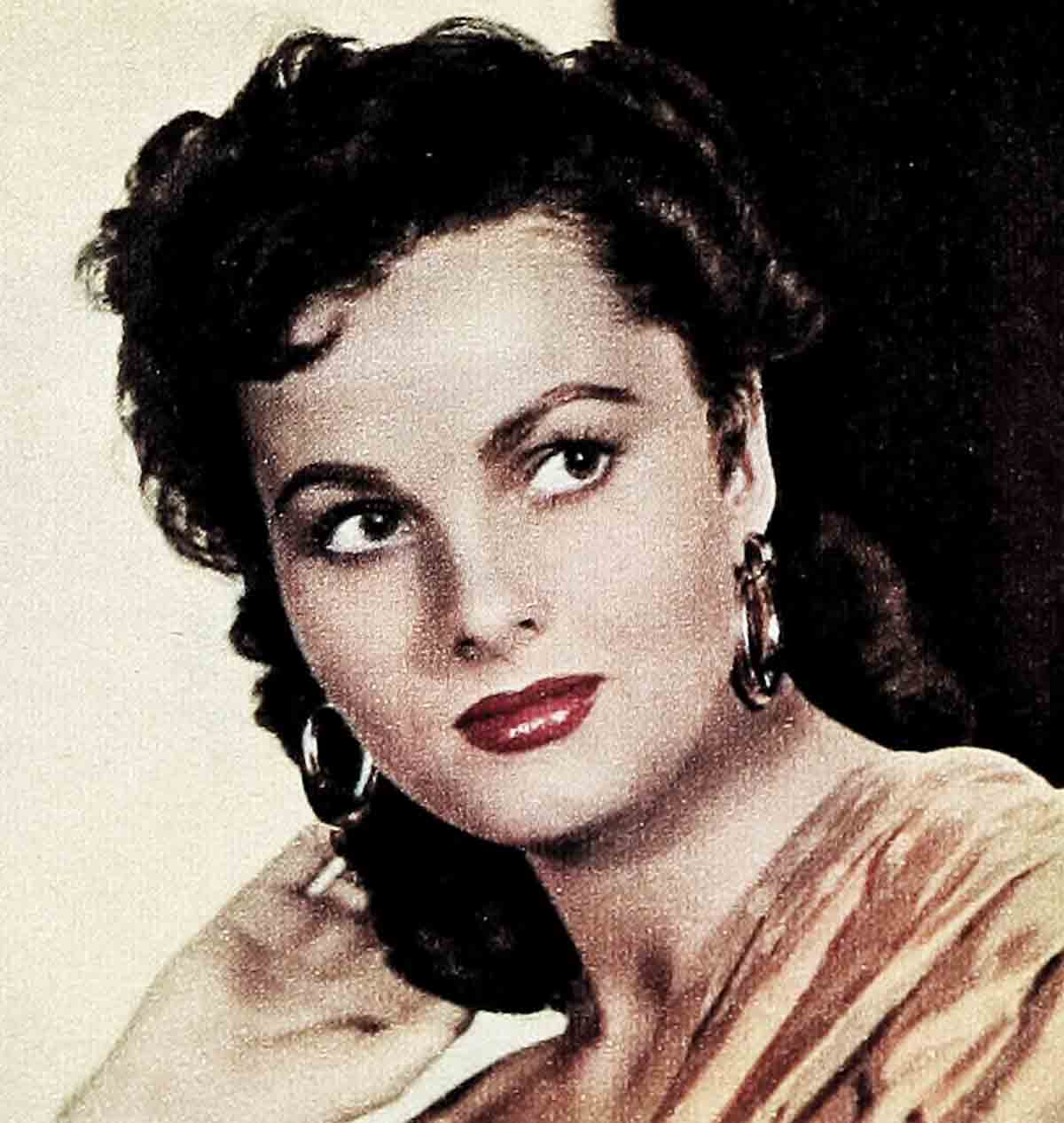
And a tall lovely German girl strolling along a street in Westwood, her thoughts in Hamburg with her mother and her two children, and her heart full of anxious hope that nothing would go wrong—that soon they would be joining her here in America—is stopped by a little girl, a little girl she doesn’t know, but who apparently knows her very well.
“Aren’t you Miss Thiess?” she asked. Yes, she was Ursula Thiess. “Well, we have chosen you,” the girl informed her gravely. “My whole class, back home in Texas—we all voted for you.”
As it dawned on Ursula Thiess what the little girl meant, she smiled her gratitude. “You choosed me?” she repeated happily. When more officially informed later, she said, “It is all a wonderful fairy tale come true.” These wonderful people, this wonderful America—all of it. How to say—how to express what was in her heart? “Like—like a varm rain. . . .”
They’re all a little lost for words. The right words. Like Christmas. Like a present. And from Hollywood to Ham- burg—and return—like a “varm rain”—
Your stars of tomorrow? Already they’re shining up a storm.
Twenty-one-year-old Tab Hunter, of the Marine physique and the soulful face, is slated to star in a big-budget western at Columbia studios. He celebrated immediately by going out and buying himself a horse—“he’s a jumper—and he’s so wonderful—” he says of the horse he named “Out on Bail.” Adding, “Got a lot of ability too—I’ve seen him clear five feet.” Tab himself cleared high ground, after a quiet period of preparation, when he zoomed to stardom in one picture.
All of it still seems a little unreal to Tab, dating from the night he was standing backstage at the Ice Capades talking with a girl friend, a skater with the company, when star-discoverer Henry Willson tapped him on the shoulder and asked, “Would you like to be in pictures?” As Tab puts it, “I just about dropped over!” As he felt like doing that first terrifying day on the test stage when Director Stuart Heisler instructed, “Now take her into your arms and kiss her!” And when they’d broken apart, the beauteous Linda Darnell had looked up and smiled, “That was very nice.” She then assured him, “Don’t worry. I’m good luck for newcomers.” To which Tab says now, “She sure was!”
Lucky too are Universal-International and their lovely Lori-lei, a dreamy natural blonde who first came to Hollywood’s attention at sixteen, when the Nelsons’ next-door-neighbor took a snapshot of her and sent it to a producer-friend.
Lori Nelson’s looks plus her dramatic ability make her a double-threat to her studio where, following ingenue leads such as that in “Ma and Pa Kettle at Waikiki,” she’s being carefully groomed for important dramatic roles. She will sing and dance as Donald O’Connor’s co-star in “Nothing But the Blues!” The fact that she looks as soft and fluffy as a kitten . . . like her blue and yellow organza bedroom in her Encino home . . . belies her ability to shoot a 22-revolver “with both hands,” as she says matter-of-factly, and her dexterity in tossing a man over her shoulder via jiu-jitsu. It seems Lori’s father, a camera technician, is also a deputy sheriff on the side—“and he practices his jiu-jitsu training on me while my mother grabs her vases,” Lori laughs.
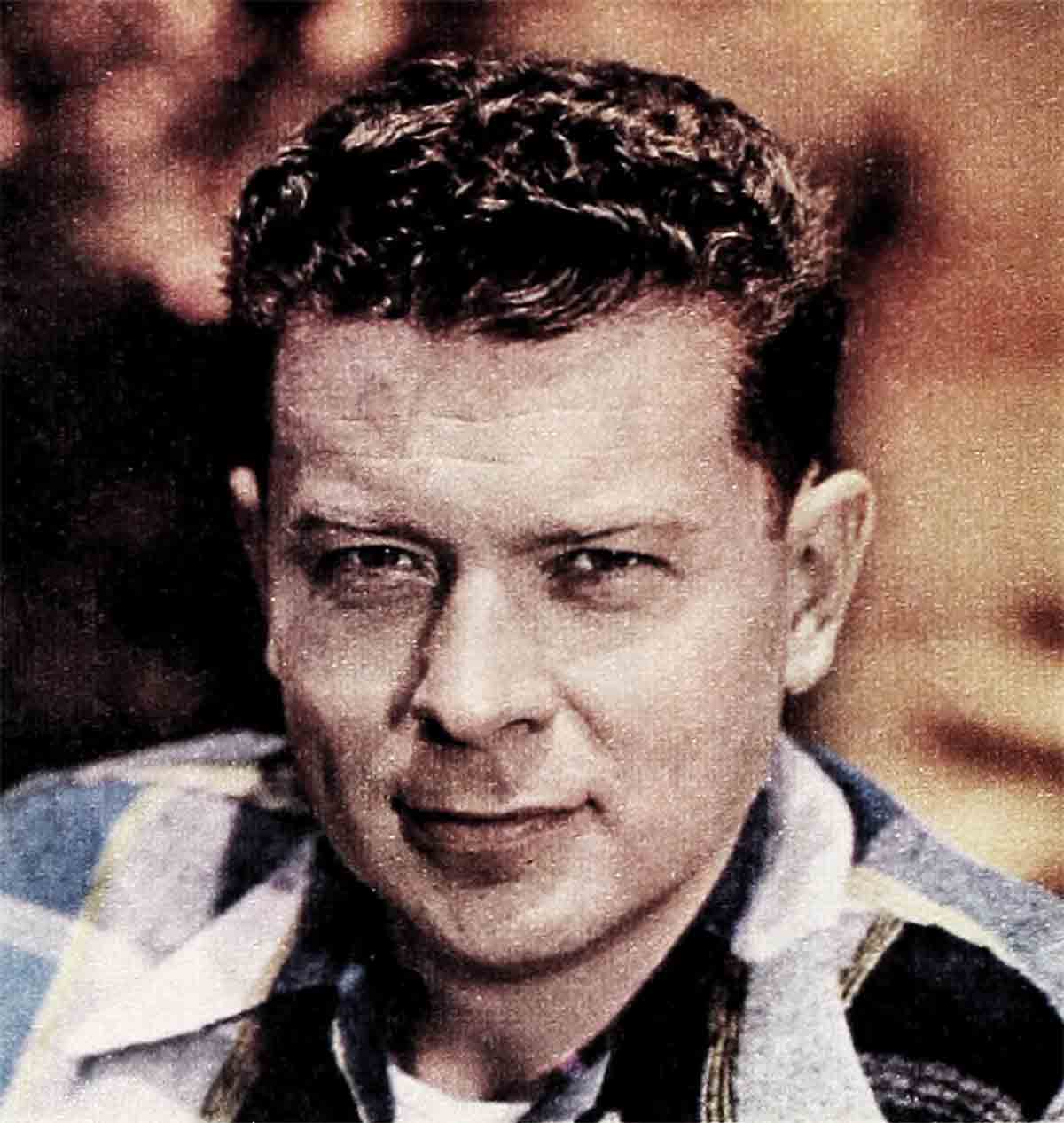
A sure-shot for continued stardom is Arthur Franz, who sniped his way to that stardom as the psychopathic killer in Columbia’s “The Sniper.” His success comes after years of ushering in theatres, working as a page boy—“I was a page boy at Radio City before Gregory Peck was a page boy at Radio City, and that’s my claim to fame.” Finally he appeared on Broadway in such hits as “Command Decision” and then worked in Hollywood as a counter-man at the small Cottage Café. “I made twenty-five dollars a week and tips—and believe me, I had more stage fright doing that than anything I’ve ever done.” Columbia’s been taking full advantage of the versatility of this star talent, with the clean-cut features and convictions. He enacts a lead role with Julie Harris in “Member of the Wedding,” and that of a G.I. in “Eight Iron Men,” and has the romantic lead in “Rainbow Round My Shoulder.”
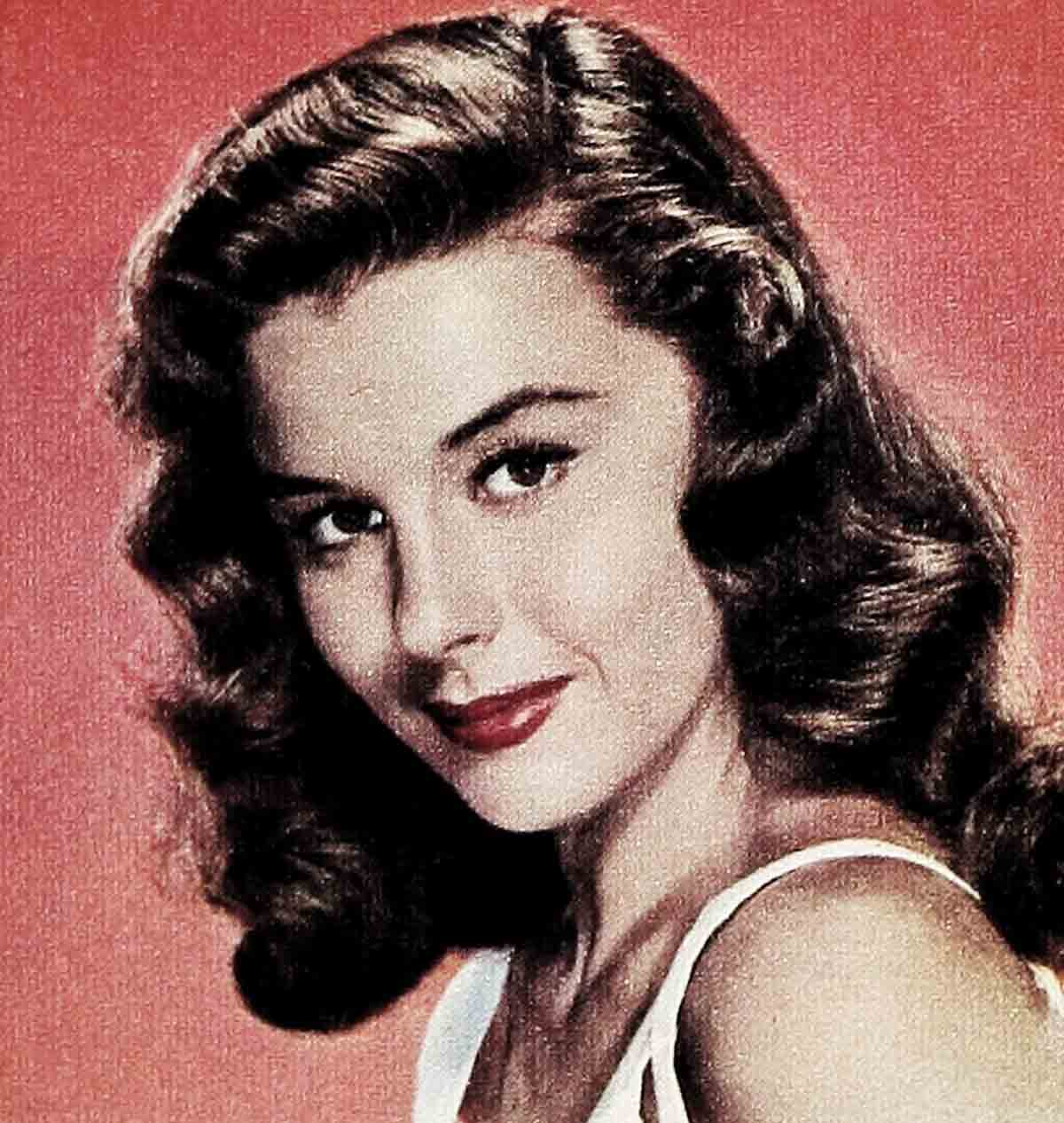
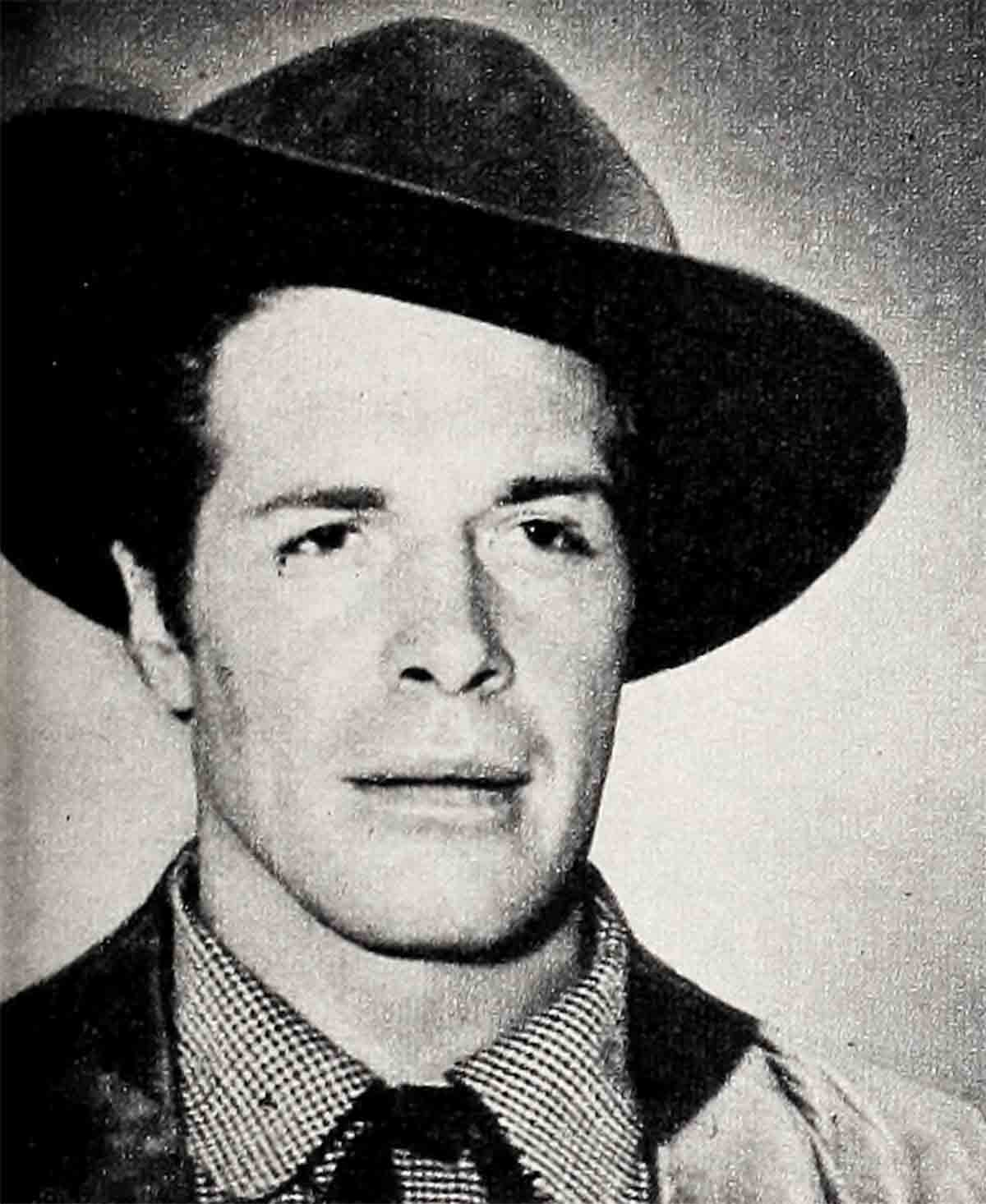
Luscious cover-girl, Elaine Stewart, daughter of a Montclair, New Jersey, policeman, says, “I was always dancing and goofing around in my Mother’s clothes.” From the age of thirteen, she worked as an usherette in the hometown theatre—just a screen away from her dream—saw every movie every night, and worked on her school books until 2:00 Am. after she got home. Out of school, she got a job as a Harry Conover model because, as she told him honestly, “I think this is the best way to get into motion pictures.” His answer was “You know, that’s just where I think you will get.” Her lovely face appeared on all big national magazines, she was getting top pay of twenty-five dollars an hour, she was on the cover of Macfadden’s “True Story” for twelve consecutive issues, “I think it’s the first time a model ever posed for that many successive covers”—when Hal Wallis brought her to Hollywood and put her into Martin and Lewis’ “Sailor Beware.” Since M-G-M bought her contract, they’ve cast Elaine in seven films in less than a year—“including a wonderful part in ‘The Bad and the Beautiful!’ I’m the ‘bad’ girl who gets Kirk Douglas away from Lana Turner—and that’s good. Bad girls hold an audience’s interest—and remember you when you’re sweet later on.” Now she’s starring with James Whitmore, Ralph Meeker, Robert Horton and Sally Forrest, in M-G-M’s “Code Two.”
This year’s “Choose Your Stars” was actually an international contest. It numbers winners like Germany’s Ursula Thiess, who has the longest eyelashes in Hollywood, and who is so beautiful, a girl friend of hers puts it, “I wouldn’t be caught dead walking beside her. I always take extreme care to walk two paces behind.” Fittingly enough Ursula, a former German model will be starred in the coveted role in RKO’s “Size Twelve,” as well as in “Monsoon.” Which seems almost as unbelievable to Ursula Thiess—but not quite—as the time the RKO European office first approached her she explains now. But the third telegram from them took her to Frankfurt, “and they told me they want to make seven-year-contract.
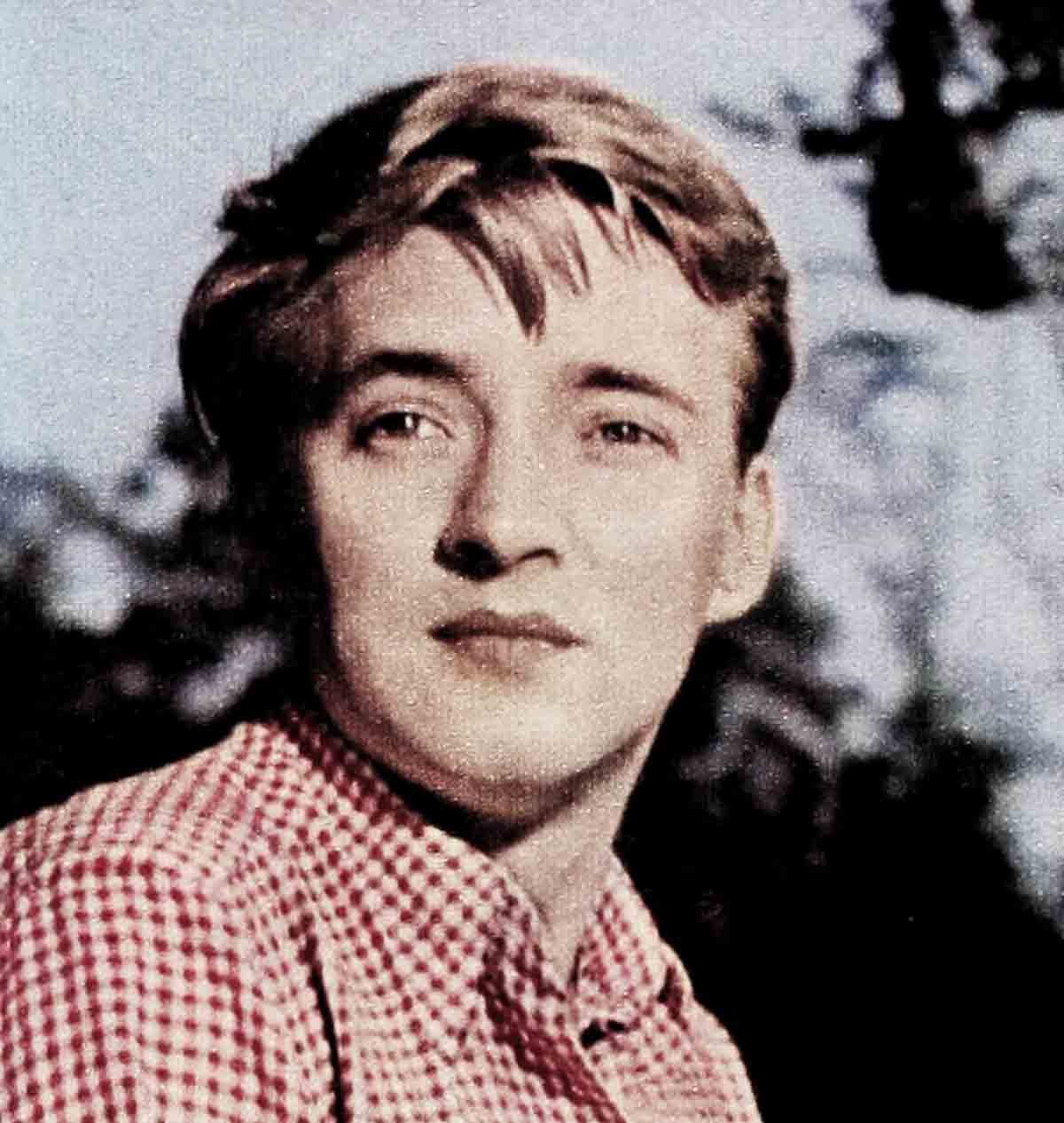
“I could not speak English—I just shake my head, ‘Ja!’ ” But she didn’t tell anybody except her mother her good news—“for fear I am big flap—flop,” she corrects in her charming rich accent.
But Ursula Thiess is far from a “flap.” Likewise, Austria’s talented twenty-eight-year-old Oskar Werner, sort of a young man’s Peter Lorre. His thatch of taffy-colored hair, he carefully maintains casually like an unbound whisk-broom. He handed a bit of shock to seasoned publicity boys expecting a matinee idol when they met his Hollywood plane, following his hit in “Decision Before Dawn.” Although Twentieth Century-Fox holds an option for two more pictures, with “The Man Who Fooled Hitler” shelved, Oskar has returned to Vienna and may not be in Hollywood again soon.
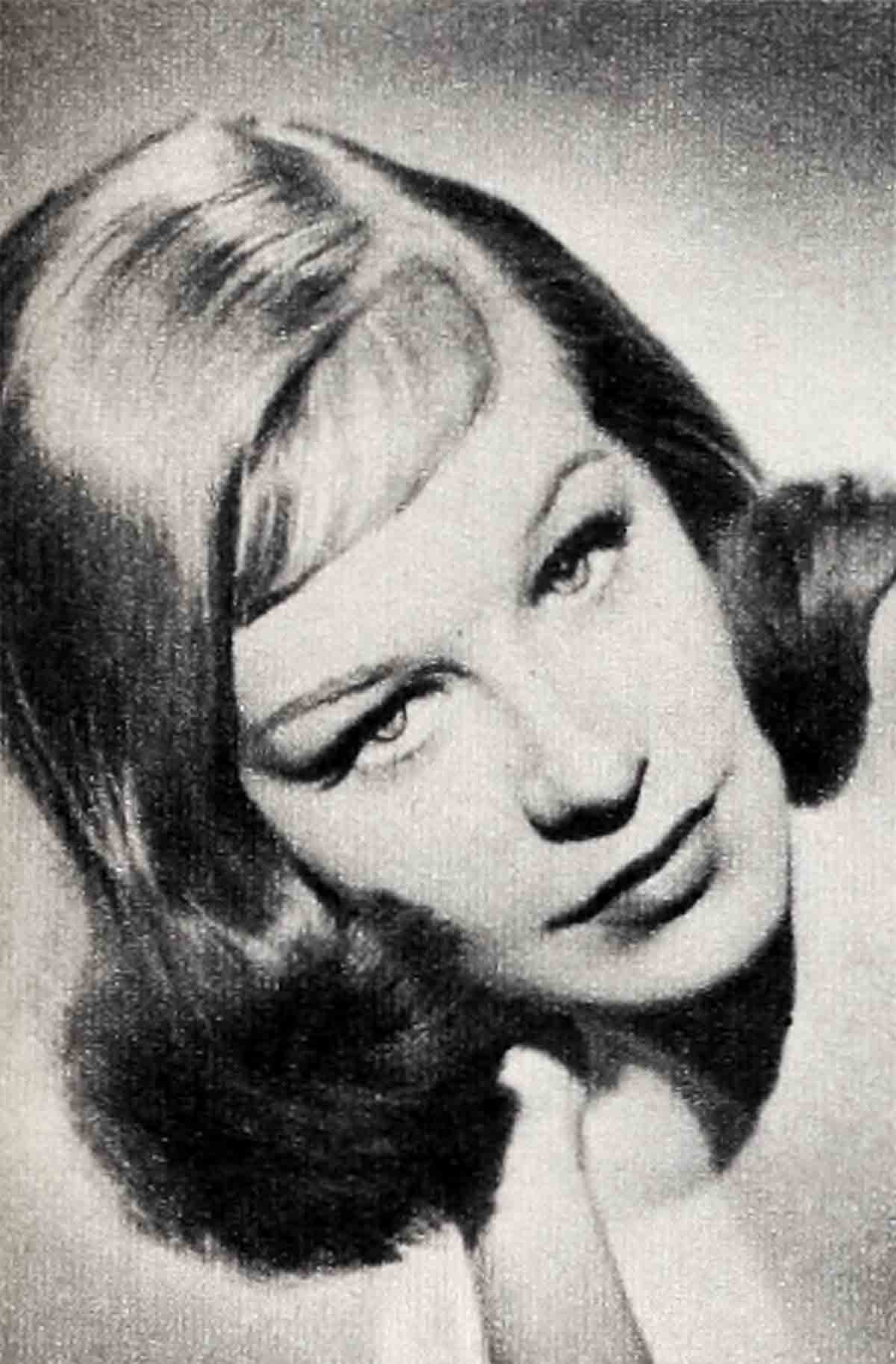
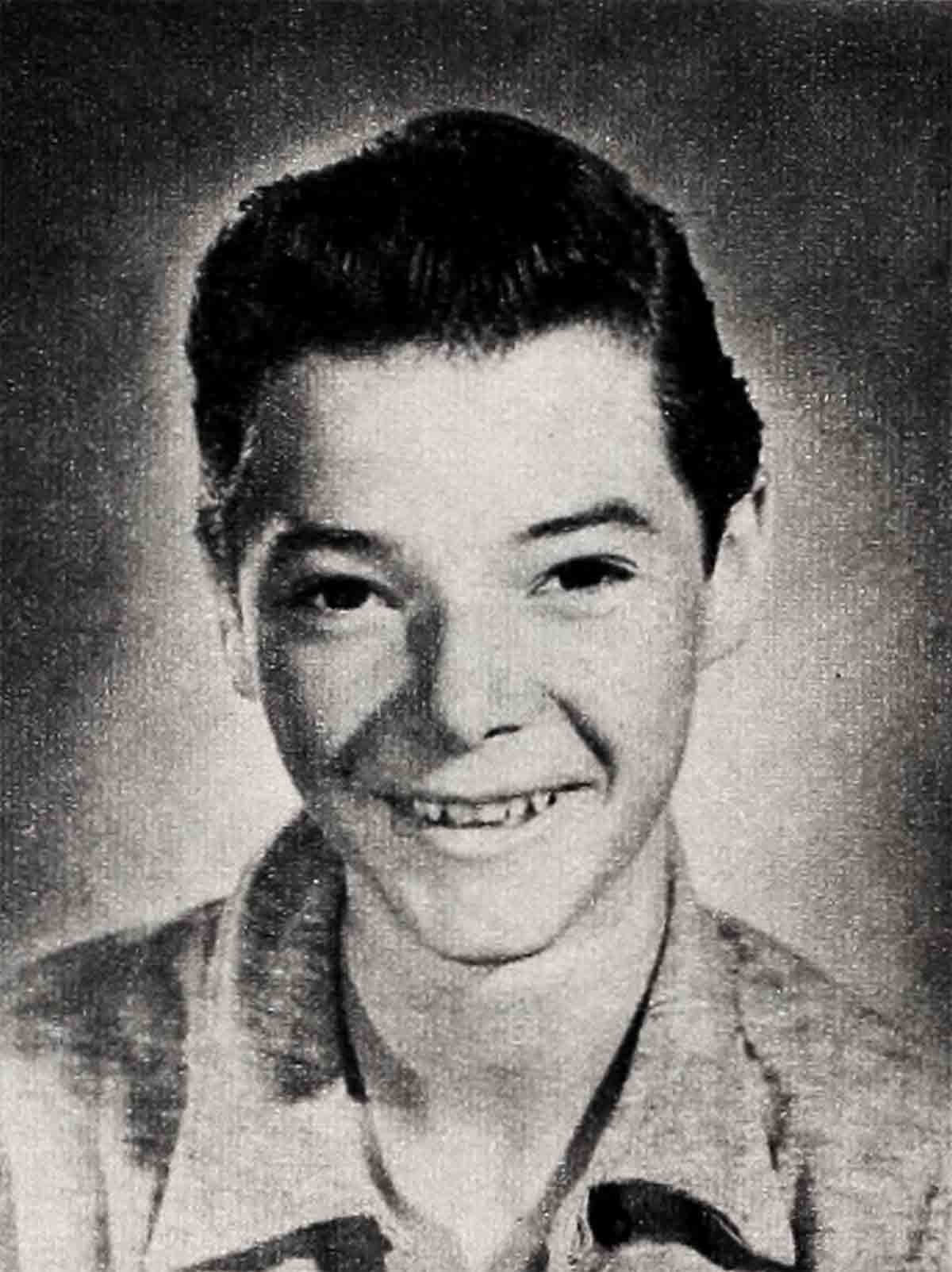
From Ulm, Germany, comes Hildegarde Neff, who is now an American citizen, and who commutes back and forth between Hollywood and Europe for films. Following Twentieth Century-Fox’s, “Snows of Kilimanjaro,” Hildegarde has been in France starring in Julien Duvivier’s “La Fete d’Henriette,” and starring in “Illusionen in Moll,” for Eric Pommer in Germany before returning to Hollywood and her next commitment.
From England, come piquant-faced Dawn Addams and Joan Rice. Joan, who first came to the attention of British producers when she was working as a waitress and won a beauty contest among employees of the restaurant chain, skyrocketed to stardom as the fiery and gay-spirited Maid Marian in Walt Disney’s “The Story of Robin Hood.” She’s co-starring with Burt Lancaster—portraying a half-caste native girl in Warner Brothers’ “His Majesty O’Keefe.”
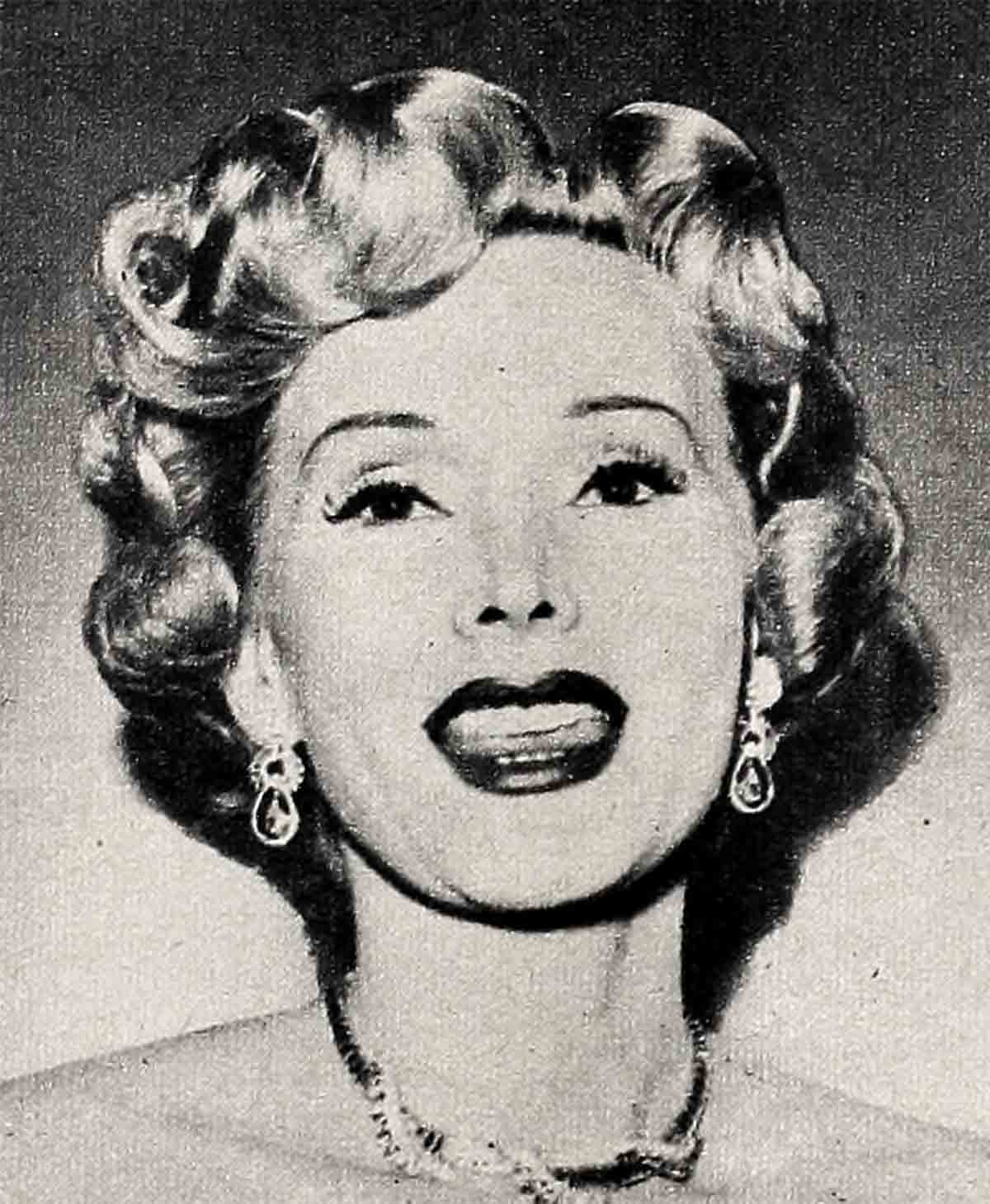

Dawn Addams, daughter of a distinguished RAF flier, James Addams, had a girlish crush on Van Johnson, when she was attending The Westlake School for Girls here during the war years. Today she finds herself romantically paired with Van as Priscilla to his John Alden in M-G-M’s “Plymouth Adventure.” Although she was signed by Metro in America, Dawn’s first big role required that she return to her native England and co-star with Peter Lawford in her studio’s “The Hour of 13.”
Hungary’s fabulous candidate, Zsa Zsa Gabor, with her champagne-colored hair and personality, her paprika-ed phrases, her personal bejewelled philosophy to the effect that twenty-six carat diamonds surrounded protectively by mink are a “working girl’s best friend” and that “every woman should have a mink to keep her varm”—has Hollywood thoroughly ga-ga-ed. Zsa Zsa burst into motion pictures with her dazzling impact when she agreed to do a guest-shot on CBS’ televised “Bachelors’ Haven.” She was an overnight sensation, with various studios bidring for her. She will next be seen in M-G-M’s “Mademoiselle” and “Lili,” and in Director John Huston’s “Moulin Rouge.”
Brooklyn-born Johnny Stewart, seventeen-year-old son of a meter reader, is a fine actor who left a string of credits in Broadway hits including “The King and I”—to come to Hollywood for the part of the young jockey who twisted your heart as Bill Holden’s pal in “Boosts Malone.” He followed that as an Indian boy in Columbia’s “The Sabre and the Arrow” and was given his studio release recently when no forthcoming productions had roles for him. Back to the theatre again, his role in “Bernadine,” which is in the try-out stage as we go to press, may give Johnny a return ticket to Hollywood.
On the other hand, twenty-eight-year-old Bob Horton, M-G-M’s magnetic redheaded brown-eyed charmer, was born in Los Angeles, had to over-ride the objections of his wealthy parents to act, and Bob went East to do his prepping for Hollywood. He studied with the Theatre Wing, and worked nights in a New York restaurant (ironically called “The Californian”) as fry cook and cashier, finally got bit roles in television. His fine performance in the lead in a TV “Suspense” show inspired Warners to cast him without a test in “The Tanks Are Coming.”
Now under contract to M-G-M, Bob Horton is really on his way, having just starred as Gilbert Roland’s Indian son in “Apache,” and currently starring as the only white member of a cast which co-stars Dorothy Dandridge in M-G-M’s picture-plea for better racial relations, “See How They Run.” His parents have long since forgiven him. “They even save my clippings,” he grins.
Such problems work both ways. Burbank-born Barbara Ruick, M-G-M’s silver-blonde and brown-eyed singer- actress, who co-stars with Bob Horton in “Apache,” began her career in New York too. “Because of Mommy,” she says of her famous mother, actress Lurene Tuttle. “T didn’t want to just be known as ‘the daughter of—I wanted to make my own name . . . and on my own.” Finally, down to her last five dollars in travelers’ checks, Barbara saw a sign saying, “Open Audition—ABC Theatre—Must Sing and Dance.” She really couldn’t dance, but figuring that by then she had nothing to lose, she turned in. Out of eight hundred applicants, she wound up one of the ten girls given a job in the chorus of the Chico Marx TV show. “But I felt the other girls hated me, that I held them back.”
When Barbara visited her mother in California a year ago and guested on some television shows, an agent took her out to M-G-M, where she was signed to a seven-year-contract that goes up to $2,500 a week, if all options are exercised.
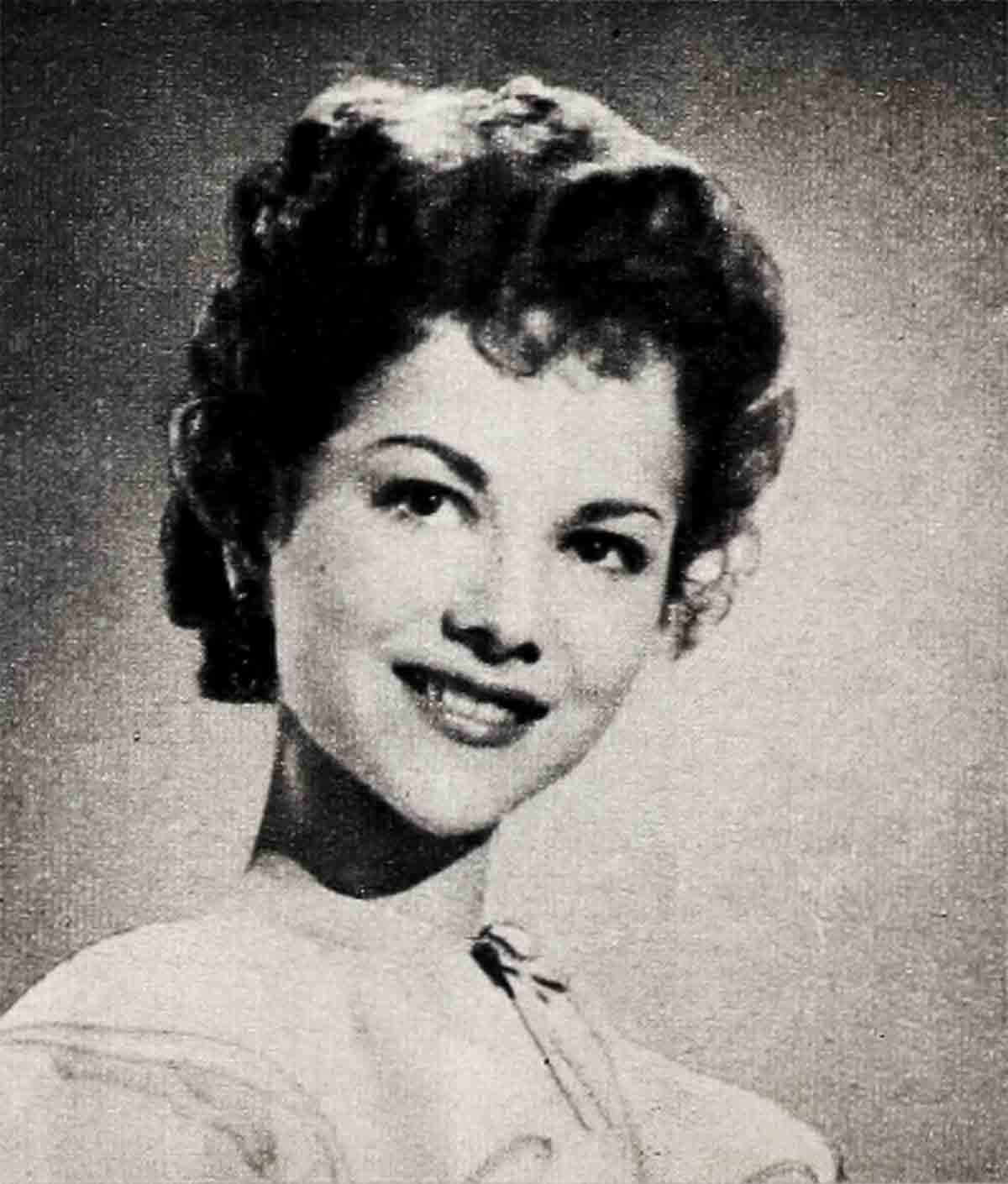
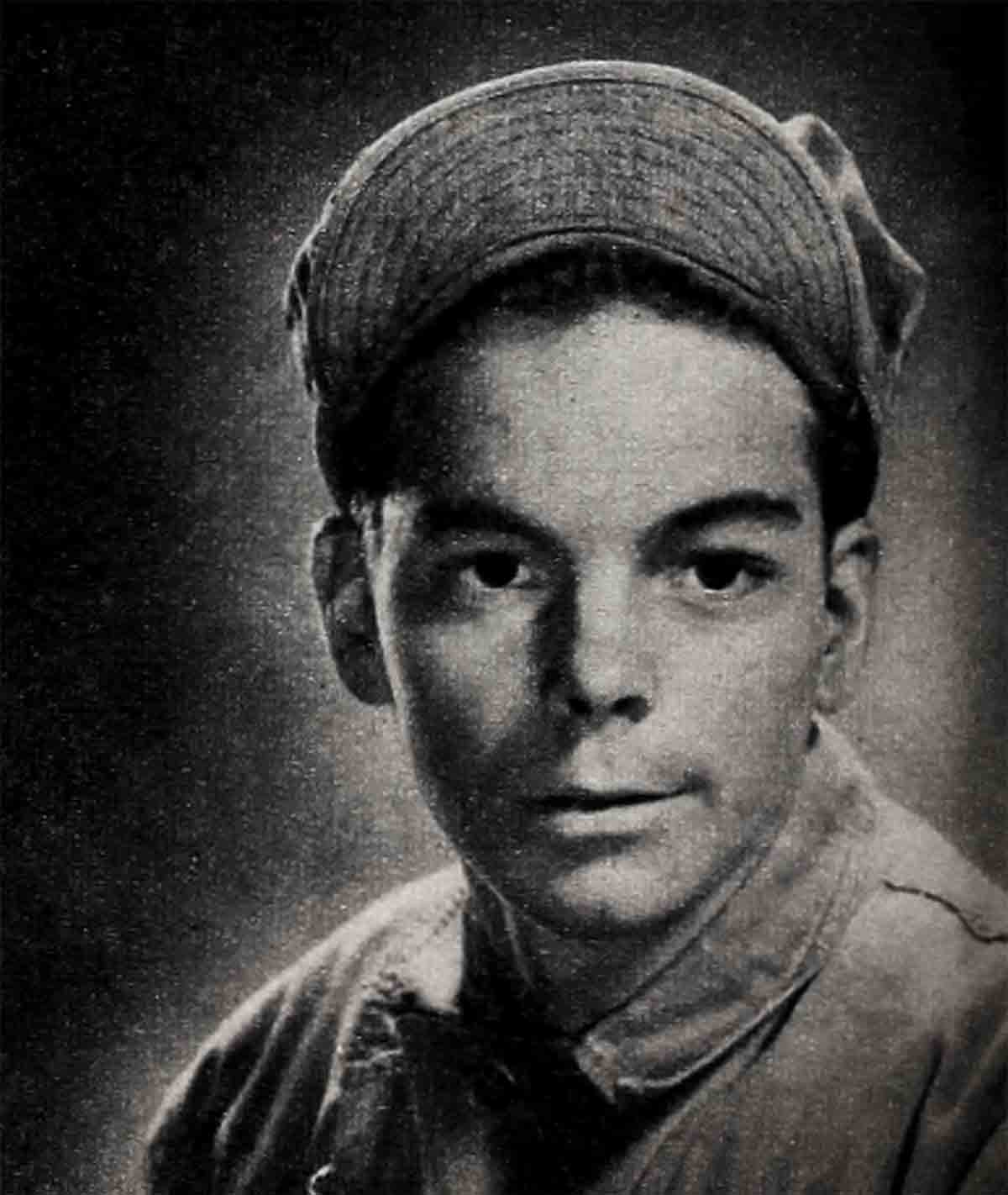
Certainly nobody knows better than does vivacious, red-headed Helene Stanley, last seen in a fine performance as Gregory Peck’s first girl friend in “Snows of Kilimanjaro,” that growing up on a movie sound stage and living next door to the screen are no insurance for stardom. As versatile and talented as any young actress in Hollywood, twenty-one-year-old Helene first portrayed “the good girl” in “Our Gang” comedies; she played the piano in “The Starmakers,” with Bing Crosby; at Walt Disney’s “I did the choreography and animation for the body of ‘Cinderella’.” She’s been under contract at U-I and M-G-M, and recently left Twentieth after two and one half years there. But never the right part. The part with her name on it. But by the time you read this, Helene Stanley will be starring in the TV series, “Career for Cathy”—which, after fifteen years in movies, may return her a star “over-night.”
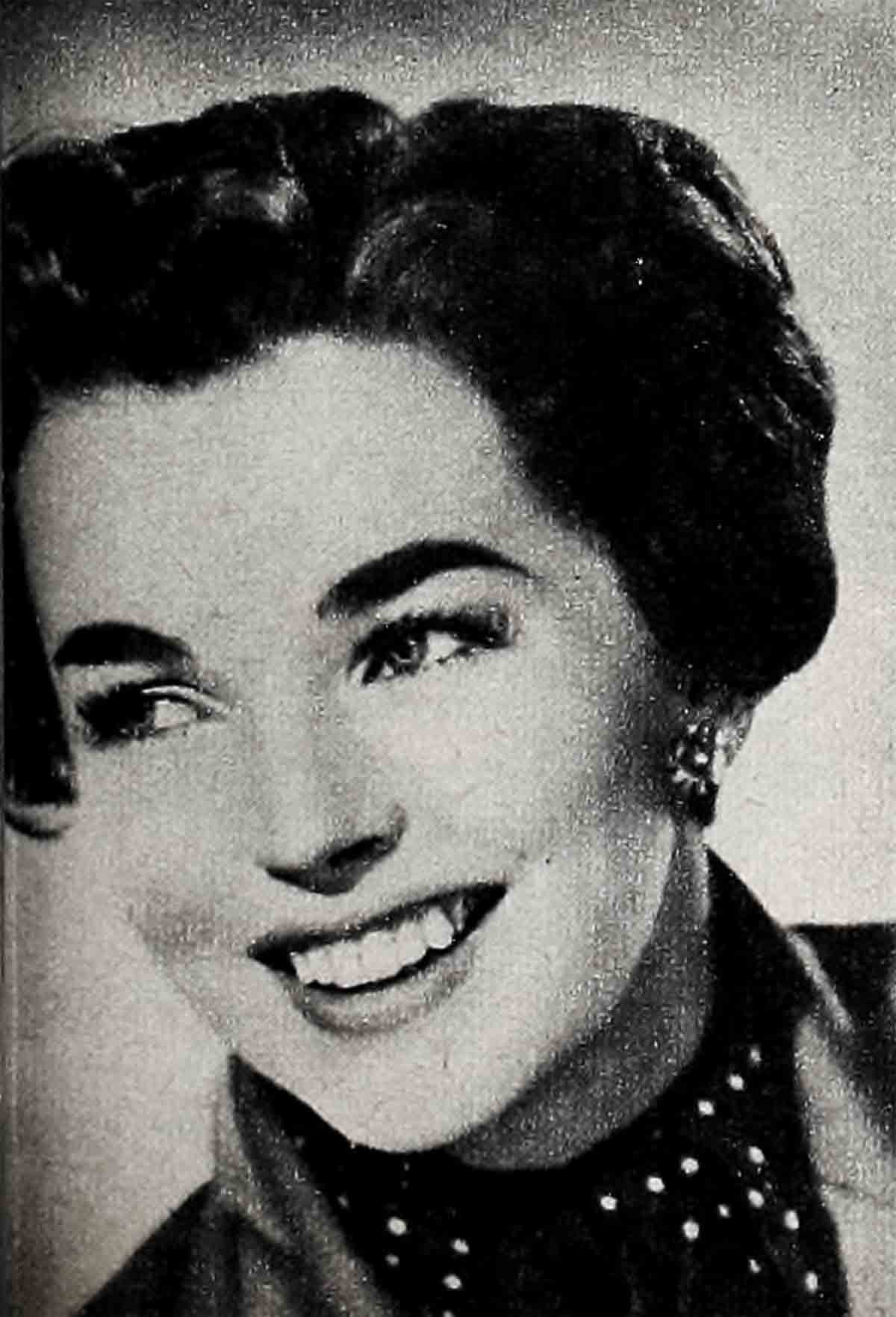
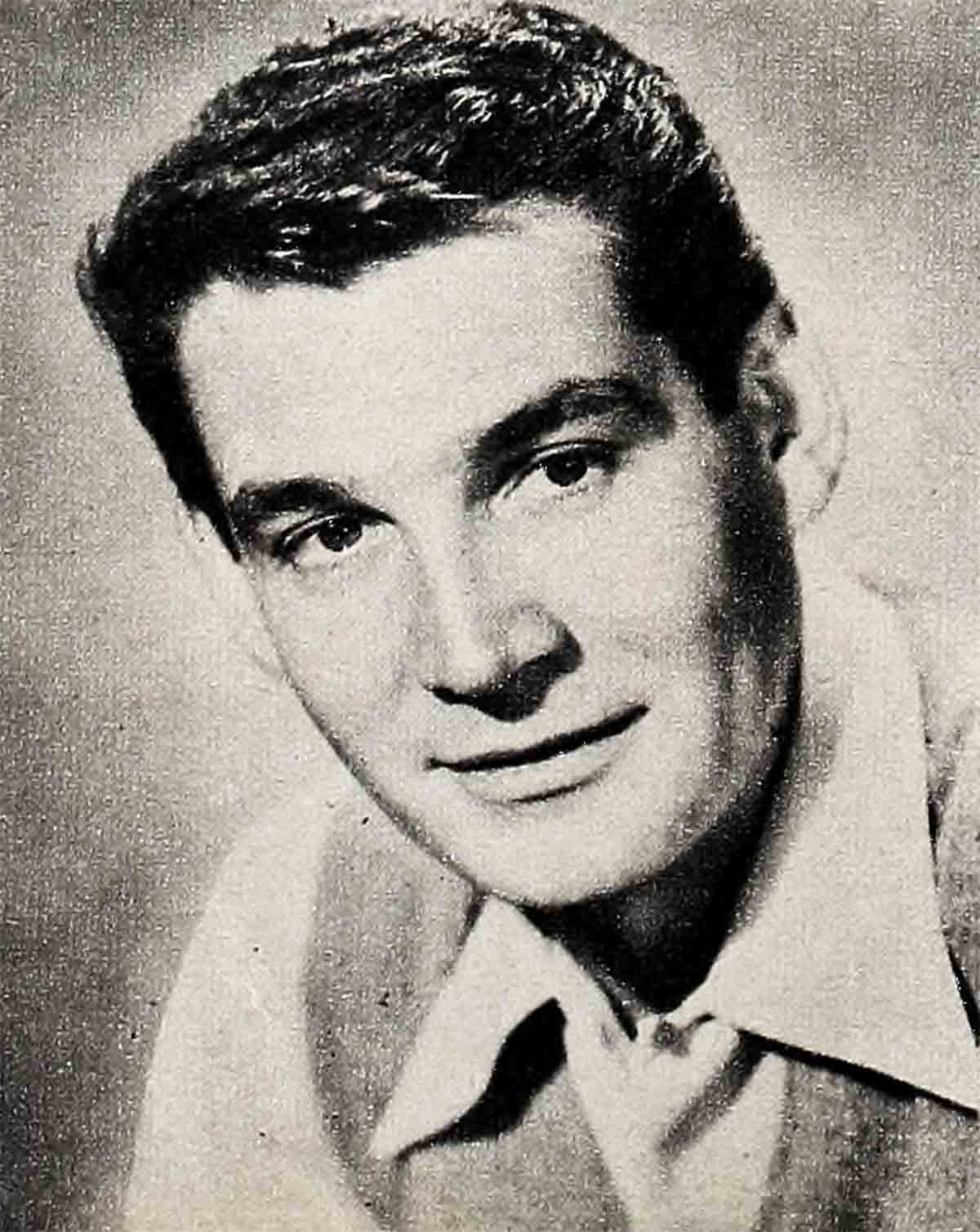
Which is what Paramount’s handsome newcomer from television and musical comedy, Gene Barry, next to be seen starring in “War of the Worlds,” and slated to star in the big remake of “Spawn of the North” means—with his years of struggle behind him—when he affirms that whoever defined success as “ten per cent talent and ninety per cent guts” had the percentage dead right. “It’s the guts—the drive—that’s important,” says Gene now.
“Talent can develop as you go along. In three years in television you can do seventy-three plays—I did—and break down seventy-three different characterizations. But if you don’t have the guts to stick it out all the way—nothing else would matter. You’re not going any place anyway.” He believes he was under a slight advantage, in being born in Manhattan—“this was during the depression years, and it was still rough. I got twenty-five cents a day from my mother for fare to look for the jobs,” says Gene. He added the happier information that Paramount just picked up his option.
North Hollywood’s seventeen-year-old Rusty Tamblyn, signed by M-G-M after Dore Schary ran a print of “Retreat, Hell” and wanted Rusty for “The Making of a Marine,” has a man’s share of both talent and intestinal fortitude. He danced, acted, and tumbled his way into the spotlight . . . and he ranks sixth in tumbling in the whole nation. A fact he brushes off with, “It just takes nerve. I was always taking dares as a kid—you know, like jumping off the roof. I practiced tumbling . . . diving into the ground. I nearly drove my mother nuts.” Also, he used to sing—“but not since the night my voice changed right in the middle of ‘You Belong To My Heart.’ ”
While waiting for his big picture, Rusty’s a very busy senior at North Hollywood High, what with belonging to three clubs too. “I’m the mascot of the girls’ club. ‘The Chanteclairs.’ I’ll never live that down. My dad is always asking me when I’m going to take up knitting. He just doesn’t seem to understand.”
Keith Andes is a dynamic blond baritone, who, following his hit in “Clash By Night” with Marilyn Monroe, is starred with Linda Darnell in RKO’s adventurous “Blackbeard and the Pirates.” Keith’s happiness in being chosen a winner was dimmed by the fact that he has learned that, due to a mix-up, he didn’t receive a great deal of his fan mail—and it went unanswered, other than by standard postcards that studios send out. Keith is genuinely distressed. “These people, they’re your friends. Without them—where would I be? Nowhere. Please tell them that if those who weren’t answered will only write to me again—I’ll take extra special care of them.”
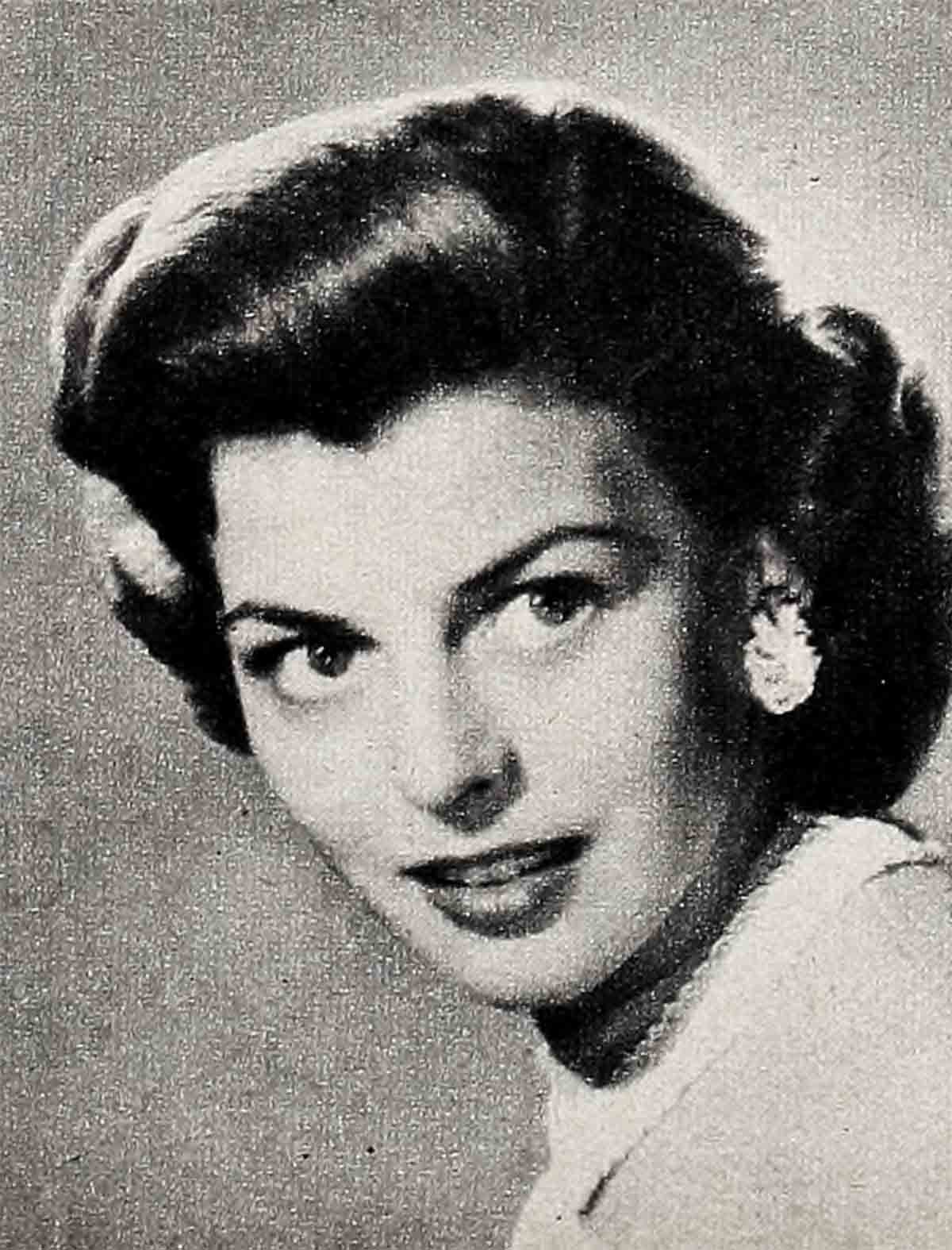
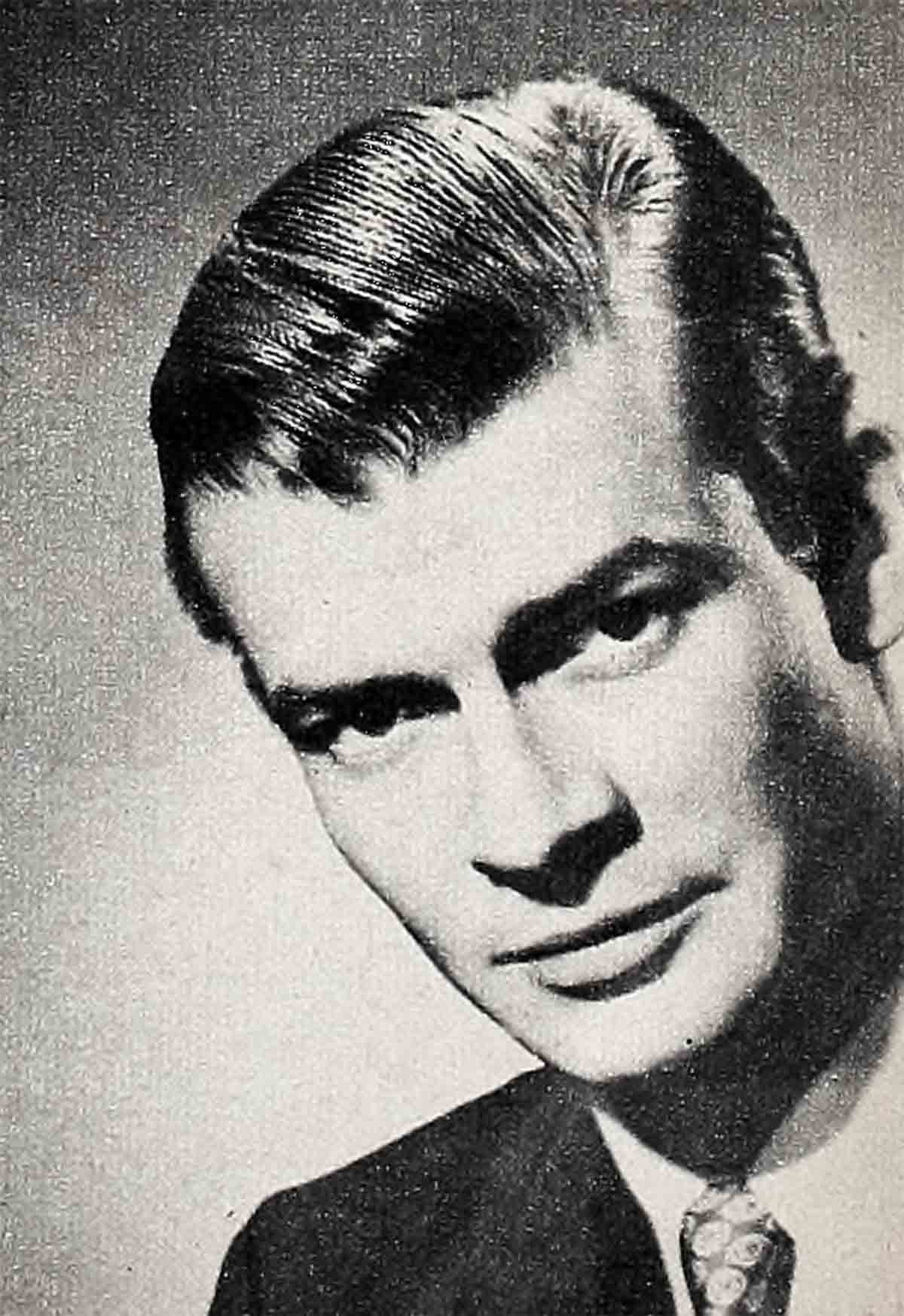
Keith, who came to RKO from such musical hits as “Kiss Me Kate,” is the son of a well-to-do Philadelphia attorney. “But my old man had the right idea about working. I carried newspapers when I was eight years old. I yelled so loud selling them that my mother was always saying, ‘Don’t scream so much, Son. You might need to use your voice some day.’ And sure enough—I did.”
They travel all roads to Hollywood, with preparedness ever the pattern. From the Pasadena Playhouse came Paramount’s auburn-haired, snappy, brown-eyed, and whistle-waisted Joan Taylor, next to be seen co-starring with Sterling Hayden in “The Savage.” Also from there—twenty-six-year-old, clean-cut Michael Moore, the son of a Yale French professor, who is next slated for Paramount’s “Adobe Walls”—and who, coincidentally, emoted opposite Joan at the Playhouse.
But theirs were different “roads” up to that point. Joan Taylor planned her Hollywood campaign from the eighth grade, “back in Lake Forrest, Illinois, when I got hold of a Theatre Arts magazine, thumbed through the ads, and decided I was going to the Pasadena Playhouse,” she says. She learned dancing from her mother, Rose Mary Erma, who has a dance school in Chicago and who once headlined vaudeville as part of a sister act. And with shining dark eyes, Joan listened to her father—who’d worked as an actor and prop man back in silent days—reminisce about when he “used to eat spaghetti with Rudolph Valentino.”
On the other hand, Hollywood was almost an adventurous after-thought to Michael Moore, when he was working one summer at the Hotel Jerome in Aspen, Colorado. “I was just a ski-bum,” says Mike. “I worked at the hotel washing dishes from three until eleven—which gave me most of the day to ski.” In an impulsive mood, he looked in on Hollywood. He decided to go to Pasadena Playhouse under the G. I. Bill, from whence he was subsequently signed by Paramount. He’s portrayed handsome heavies in “Silver City” and “The Pony Express”—a fact which surprises him almost as much as it does his step-son Bruce, eleven, who keeps saying amusedly, “Is that really you?”
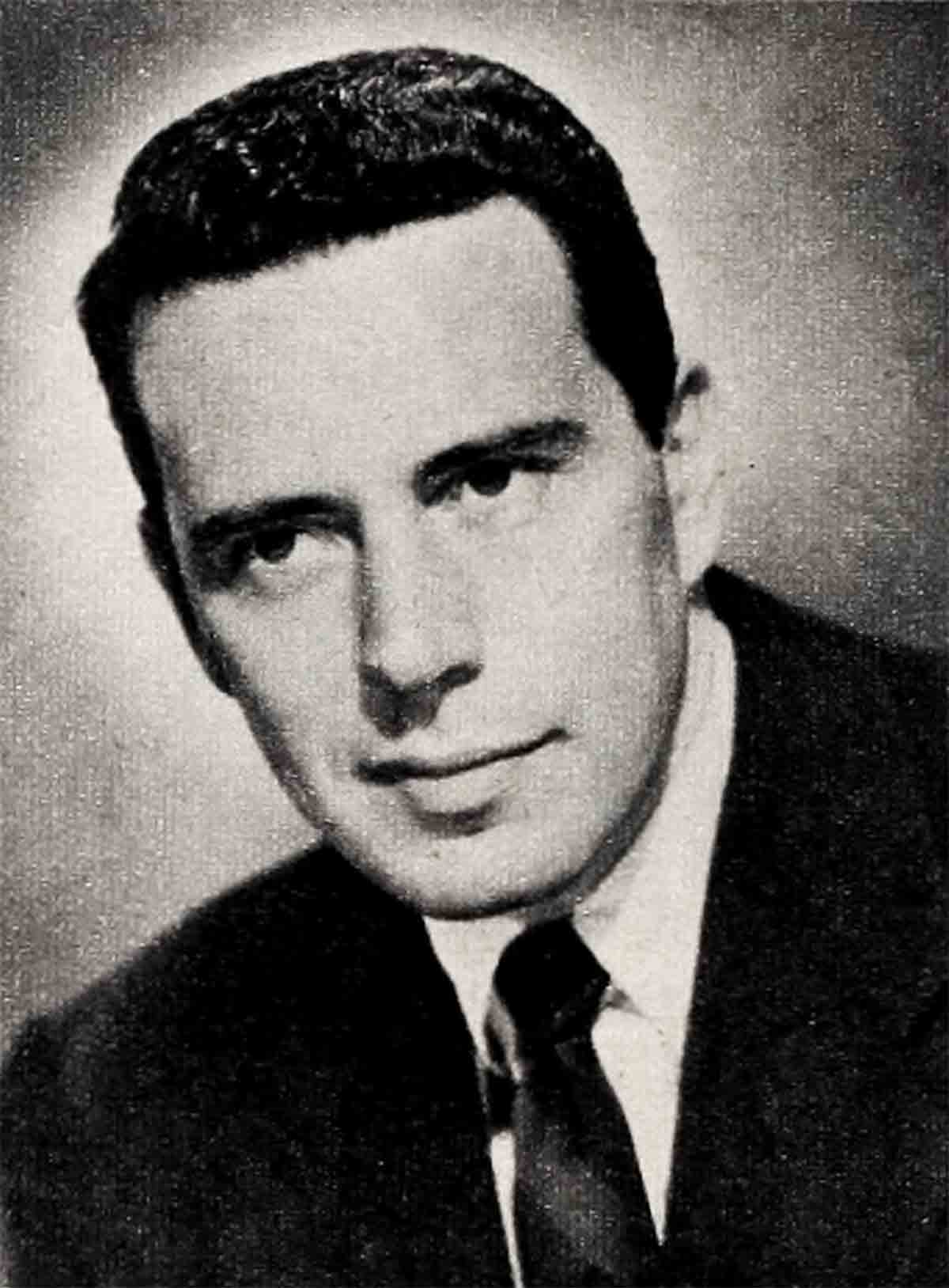
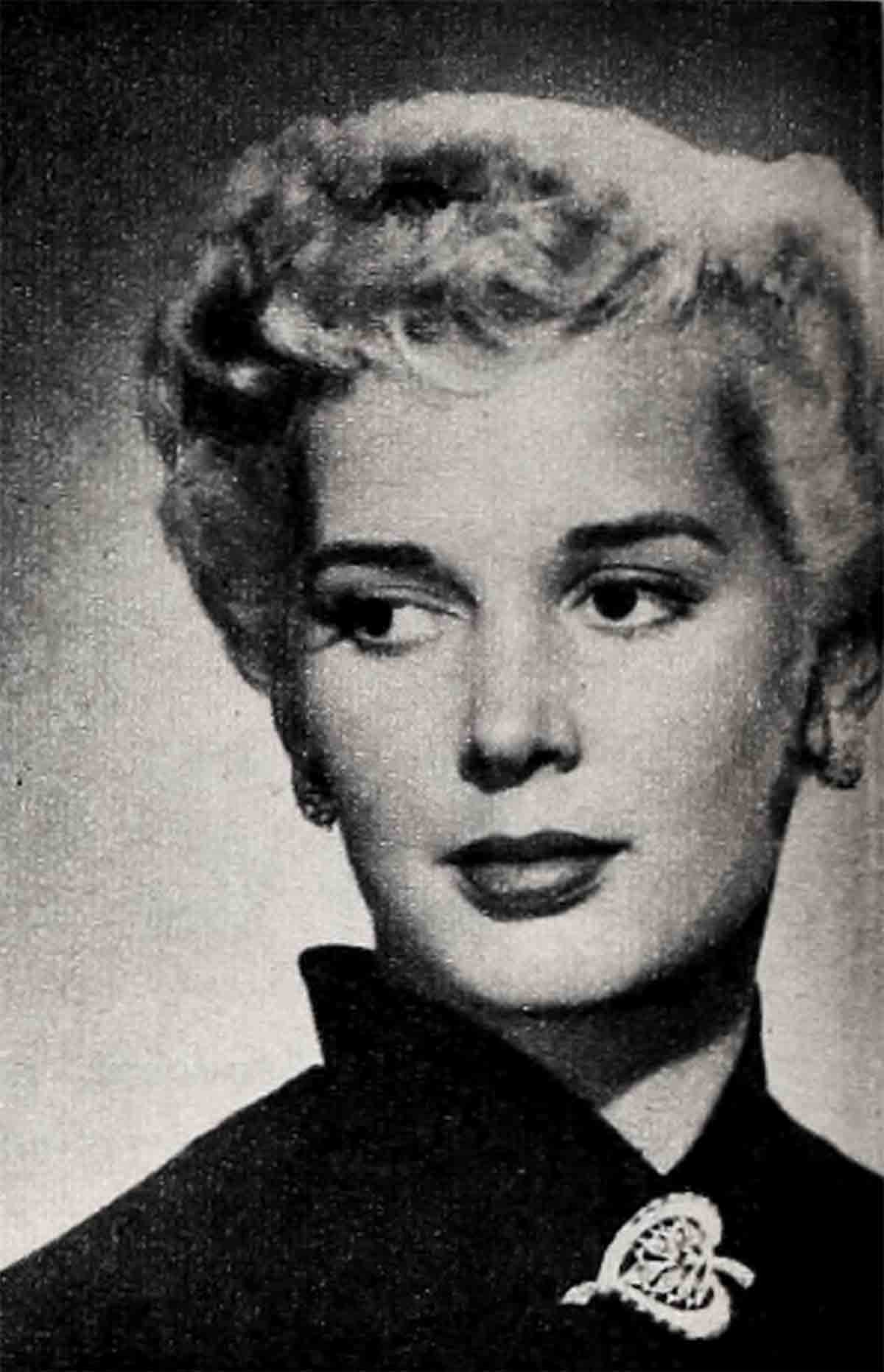
After years of important experience on Broadway in such hits as “All My Sons” and “Mr. Roberts,” John Forsythe was discovered on a “Suspense” TV show by Producer Robert Wise and Director Mark Robson. They signed him mediately without a test for the lead in Aspen Productions’ “Captive City.” However, Forsythe continues to be one of television’s brightest stars, and commutes between that medium and motion pictures. A native New Yorker, he will next star in Aspen Productions’ “Until They Sail,” which will be filmed in New Zealand early next year.
John Forsythe, like all the others, would be quick to tell you there’s no one way to the “glory road.” That experience is the surest escalator. And, as with one voice, all twenty-two reaffirm that “it takes years to be a star over-night.” It takes a tough heart, and a smile that can’t wear off. And it means struggling—even after you hit the jackpot—as it did for Beverly Michaels, who, although she continued picking up a pavcheck, didn’t work for a year after she really hit in “Pickup.”
But Beverly Michaels silver-lined cloud seven today. She’s just signed a long-term contract at Universal-International, where so many of our former “Stars of Tomorrow” are stars—and big stars—today. The daughter of a New York bus driver, this tall, striking blonde with brown eyes, began as a hat check girl at Billy Rose’s Diamond Horseshoe. But so many of the owners of the hats said, “You ought to be in the show,” that soon she was. She studied dramatics at Carnegie Hall, and did some modeling for Harry Conover. “I was skin and bones then— I’ve been eating better since,” she laughs. Her goal was the legitimate theatre, but when it seemed she’d never make it, she didn’t let her five-feet-nine discourage her from tackling motion pictures. And her height turned out to be her ally in getting her first job. She read for a featured role in “East Side, West Side” at M-G-M and says, “My height helped me get it. As it turned out, they wanted a girl big enough to murder Ava Gardner—and I was.”
Success today, too, means being resourceful and well aware when opportunity knocks—and keeping the door forever ajar. As witness M-G-M’s good-looking black-haired boy with the laughing blue eyes, Dean Miller, who, in a year’s time has been featured in “Because You’re Mine,” with Mario Lanza, in “Everything I Have is Yours,” with Marge and Gower Champion and Monica Lewis—“I loved that one—I got to sing—,” in “Small Town Girl,” with Jane Powell and Farley Granger, and he’s now working in “Dream Wife” with Cary Grant. . . . all of which began with his being in the right place at the right time.
Dean Miller, already successful in radio and television back East, was en route to California for a vacation when he met his future in the lounge of a streamliner. It began when he asked two strangers sitting near him for the time. His watch had stopped, he explained, and he came from Cincinnati and also he hadn’t set it back. “Cincinnati? I booked acts there years ago,” said one of them interestedly. And the other, “Cincinnati? I was an act booked there years ago.” “You two fellows in show business?” Dean asked, adding companionably that he worked in television himself.
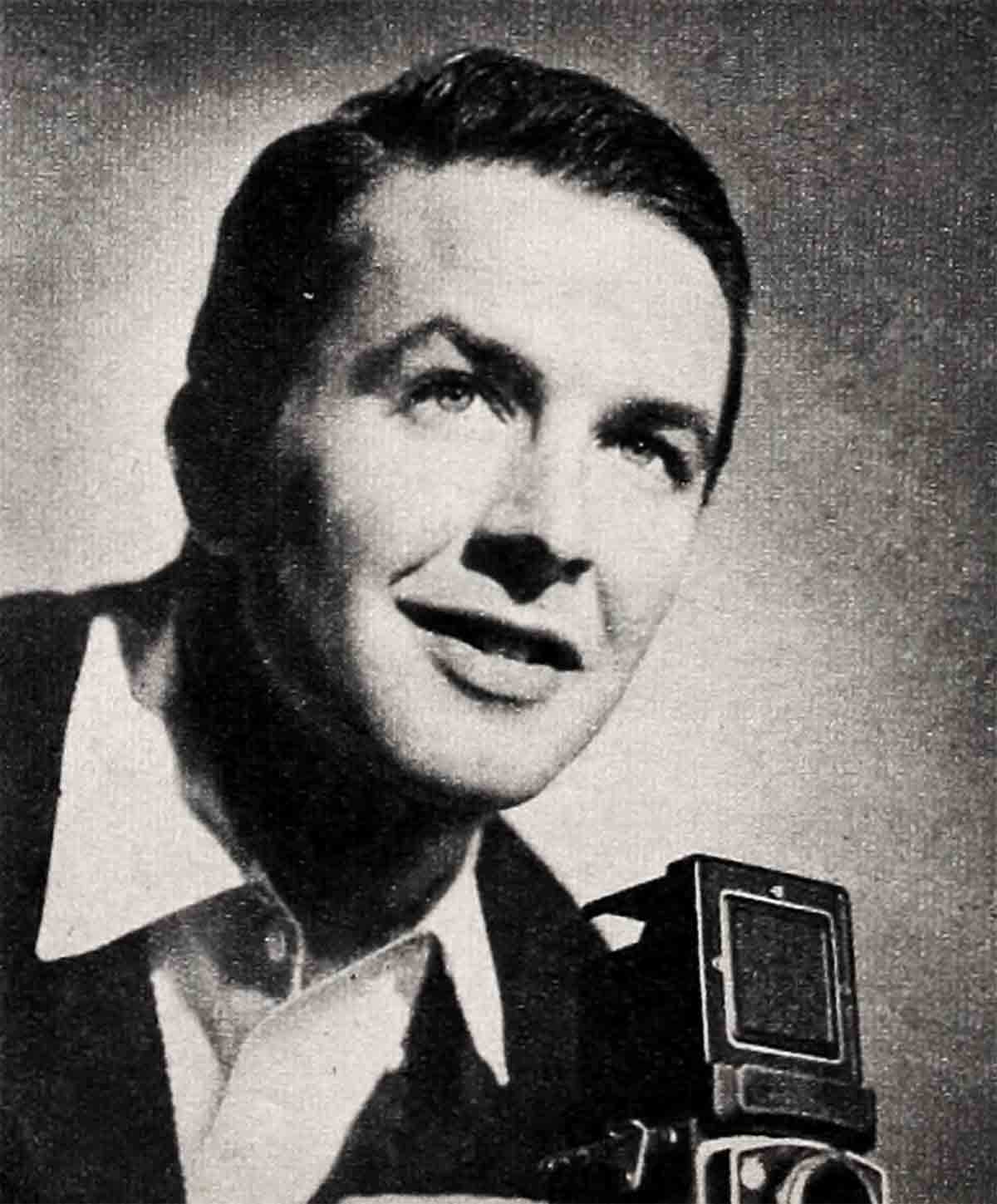
During a very vital discussion, Dean dissected today’s motion pictures, said he’d seen none of those they casually mentioned. And when one wanted to know if it wouldn’t be wise to know what his competition to television was doing, he answered in essence, “What competition?” Hollywood needed new talent, fresh faces, etc. etc. etc. Then somebody mentioned “Battleground,” which happily he had seen and liked. Whereupon one of the fellows said, “I’d like you to meet Dore Schary, the producer of that picture.” And the other smiled, “I’d like you to meet Louis K. Sidney, Vice-President of M-G-M.” Which left nothing for him to say but, “Well . . . I’d like you both to meet Dean Miller.” Two days after he arrived in Hollywood, Dean Miller’s fresh new face was signed,sealed and delivered to M-G-M.
The same resourcefulness, intelligence and realistic reasoning of today’s young veterans is reflected in their personal lives as in their professional futures. Eleven are single, eight are married, and all to professionals, with the exception of Keith Andes, who’s married to lovely Jean Cotton, ex-Army nurse, with whom he fell in love at first sight when she nursed him during the war. Three are divorced. And then there’s Zsa Zsa Gabor. But don’t be misled by that which you read—for Zsa Zsa, romance is real George!
Predominantly, their philosophy concerning marriage-versus-careers in Hollywood is summed up by Arthur Franz, who’s happily wed to actress Adele Longmire. “She’s tall—I call her ‘Stretch’—she’s very attractive, also she’s a very good actress,” he says proudly of Adele, who has the “third feminine part” in Humphrey Bogart’s “Battle Circus” at M-G-M. “I don’t object to ‘Stretch’ having a Hollywood career. Oh, I suppose I’ll probably have the same wounded male pride as the others—if she becomes a big success and I don’t,” he grins. “But I think when a man marries a professional woman he’s got to accept her independence.”
Romance versus career could be a problem, too, for young lovely eligibles like Lori Nelson, who wears the pearled Kappa Sig pin of equally eligible David Frame, Jr., twenty-two-year-old son of the vice-president of the Humble Oil and Refining Company in Houston, Texas. David, who fell for her when he saw Lori in “Bend of the River,” flew out to California and arranged for their mutual friends, Claudette Thornton and Dick Clayton, to introduce them; he “pinned” her on her nineteenth birthday. But he understands that, as Lori puts it, this wouldn’t mean they were “really engaged.” He’s her best beau, “but I’m too young for one man,” she says now. “Then there’s my career. It means a lot to me. I’m not going to be married for a long time.”
Nor is seventeen-year-old Rusty Tamblyn immune from problems of the heart. At this stage, Rusty could use advice from Zsa Zsa Gabor. “I’ve liked girls since the age of nine,” he explains. “And I like to listen to them talk. But I’m so busy listening to them tell their troubles, I don’t have time to think about my own. I need the kind of a girl who’ll listen to mine. I’m not going steady now—I’m dating the field. I’m not sure this can continue—I’m just trying it out.”
Dean Miller dates—and steadily—Vera-Ellen. And marriage bells will be ringing for them before long. Barbara Ruick goes with Carleton Carpenter, Dawn Addams with Claude Dauphin (when that’s geographically possible), Ursula Thiess, who can cook a mean cabbage roll, “and I love hunting and fishing, and in a man—I like kindness—” finds this—and more—in Bob Taylor.
They’re eager-to-contribute, active young citizens, as is Barbara Ruick, who traveled 22,000 miles in seventeen days last Christmas, singing for G.I.’s in far-flung outposts.
And like Elaine Stewart, they have great faith in God.
Theirs is a strong faith too, in “tomorrow”—which to each of them has a meaning all its own. For Beverly Michaels, it means a whole new faith in her future.
And cute Joan Taylor’s dark eyes shine with hope.
And Ursula Thiess dreams of settling down in America. “I cannot tell you what freedom means—like you have it here.”
And you? You have a share in all of it, their dreams and destinies.
THE END
—BY MAXINE ARNOLD
It is a quote. PHOTOPLAY MAGAZINE DECEMBER 1952




